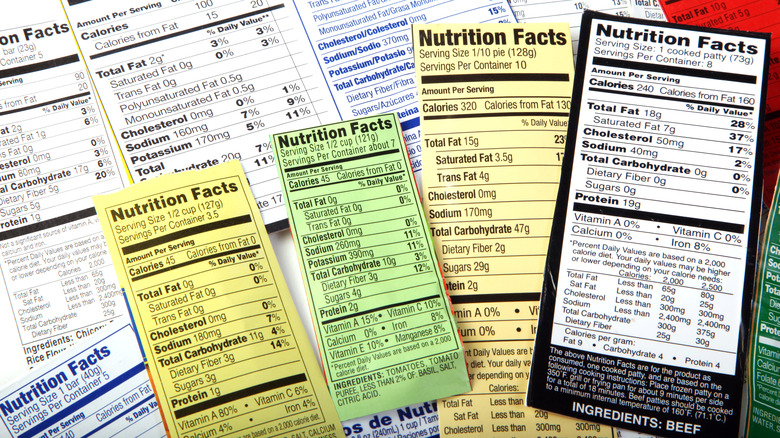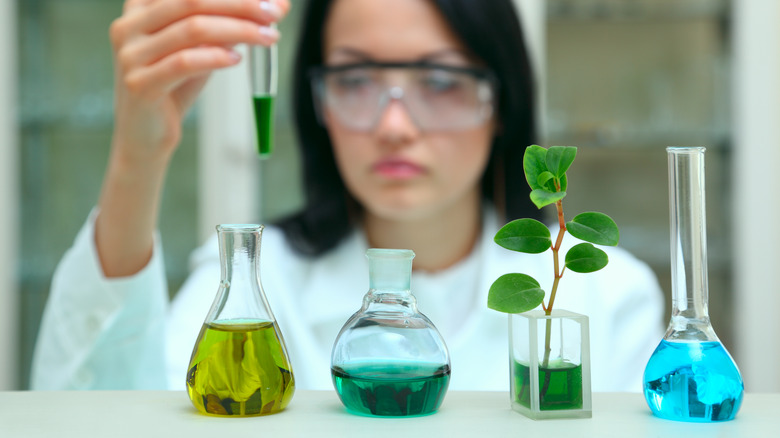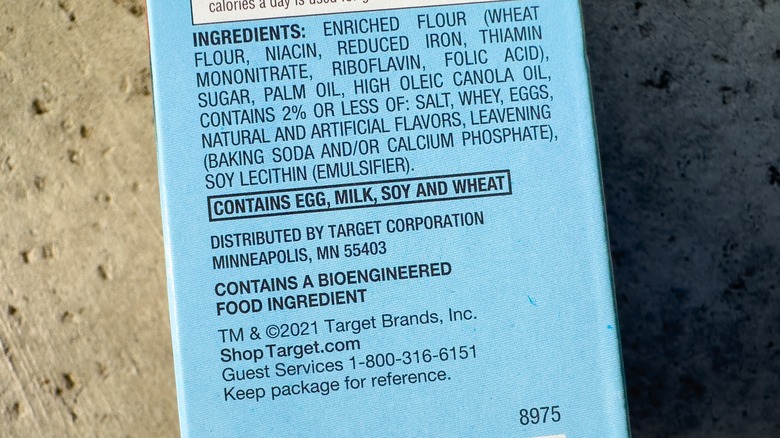What Food Brands Want You To Think About 'Natural Flavor' Labels
Hopefully, you're in the habit of reading the ingredient labels on your food. Unfortunately, doing so can sometimes raise more questions than answers. Government regulations regarding food labels can be frustratingly vague, and few terms are subject to more confusion and misleading information than "natural flavors." These words carry great weight in a day and age when artificial ingredients have given rise to myriad concerns about health and environmental impact, but they don't mean what you probably think they do.
According to a 2017 report published in the Food and Drug Law Journal, "natural flavors" rank as the fourth-most common ingredient on food labels, yet hardly anyone actually knows what the term means due to extremely vague regulations. The FDA defines "natural flavor" as being "derived from a spice, fruit or fruit juice, vegetable or vegetable juice, edible yeast, herb, bark, bud, root, leaf or similar plant material, meat, seafood, poultry, eggs, dairy products, or fermentation products thereof, whose significant function in food is flavoring rather than nutritional." That's an extremely broad definition, and it leaves food manufacturers with a lot of wiggle room for deceptive marketing tactics.
The greenwashing effect
Companies can use food labels that boast of natural flavors as part of an increasingly common phenomenon called greenwashing. Greenwashing is a marketing technique wherein businesses make false or misleading claims about their products in an attempt to appear more environmentally friendly when, in reality, they are doing little to nothing of the sort and are solely motivated by sales. In the world of food, greenwashing often incorporates claims about health and nutrition, such as claiming that a product is "all-natural" or "non-GMO" to make foods seem "healthier."
Food brands make these claims in order to attract health-conscious and eco-conscious consumers, but they are often misleading or blatantly inaccurate. Not only are there few regulations in place to define such label terms, but these claims are regularly made without any independent verification. This means that food companies can make bold claims about the supposedly natural content of their products without any other party keeping them in check. This also leaves consumers in the dark as to what label terms like "natural flavors" even mean, so before we go any further, let's clear things up.
What are 'natural flavors,' really?
If you buy a fruit-flavored popsicle, candy, or soda that contains "natural flavors" according to its ingredients, you might naturally assume that it was made with fruit juice, but that's not the case. Fresh produce has an incredibly short shelf life, and nobody wants to buy soda with an expiration date of just a few days. Instead, most natural flavors are made by isolating specific chemical compounds from natural sources like fruits. There are hundreds of compounds involved in a strawberry that contribute to its flavor, but it only takes a couple of them to create a suitable approximation for mass-produced foods. Furthermore, some of the very same chemicals that give strawberries their flavor are present in other plants, which may be used in place of strawberries to create the "natural flavors" in your food.
The manufacturing process for natural flavors isn't all that different from the process used to make synthetic or artificial flavors. Both involve isolating specific chemicals in a lab setting and combining them to mimic familiar flavors. The difference is that artificial flavors come from sources that aren't edible on their own, such as petroleum or, as was more common in decades past, coal. According to Harvard University's Science in the News, the origins of natural versus artificial flavors don't actually have an impact on their safety or even the way they taste. In fact, creating natural flavors often causes more damage to the environment, and that's not the only dirty secret food brands are hiding.
Natural flavors sometimes include artificial ingredients
Believe it or not, natural flavors can, and often do, contain artificial ingredients. When you see the words "natural flavor" on a label, they indicate a mixture of chemicals, not just a singular ingredient, and that mixture can contain upwards of 100 compounds. The compounds responsible for the flavor itself come from natural sources, but they are then combined with other ingredients such as solvents, emulsifiers, and preservatives. These additional ingredients are often made from synthetic sources like petroleum, even when they are used in so-called "natural flavors."
Federal regulations regarding "natural flavors" are so minimal that flavor manufacturers aren't even required to disclose the ingredients they use in their mixtures. However, the rules are a bit more strict when it comes to organic ingredients. If a food item is certified organic, the natural flavors used to make it cannot contain any synthetic ingredients, any extracts from GMO sources, or anything derived from irradiated crops. The strictest regulations are reserved for labels that say "organic flavors" or "organic natural flavors"; these are almost entirely made of organic ingredients, which is probably what many people expect from the words "natural flavors" to begin with.



